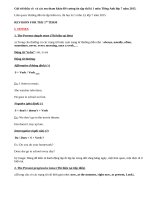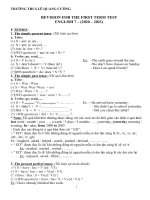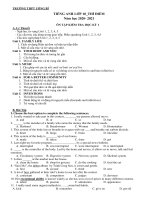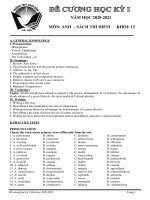Đề cương ôn tập thi kì 1 môn Tiếng Anh lớp 7 năm 2015
Bạn đang xem bản rút gọn của tài liệu. Xem và tải ngay bản đầy đủ của tài liệu tại đây (155.28 KB, 7 trang )
Gửi tới thầy cô và các em tham khảo Đề cương ôn tập thi kì 1 môn Tiếng Anh lớp 7 năm 2015.
Liên quan: Hướng dẫn ôn tập kiểm tra, thi học kì 1 môn Lý lớp 7 năm 2015
REVISION FOR THE 1st TERM
I. TENSES
1. The Present simple tense (Thì hiện tại đơn)
a) Trong câu thường có các trạng từ hoặc cụm trạng từ thường diễn như : always, usually, often,
sometimes, never, every morning, once a week, …
Động từ “to be”: am, is are
Động từ thường:
Affirmative (khẳng định) (+)
S + Verb / Verb-s/es
Ex: I listen to music.
She watches televition.
He goes to school on foot.
Negative (phủ định) (-)
S + don’t / doesn’t + Verb
Ex: We don’t go to the movie theater.
Hai doesn’t stay up late.
Interrogative (nghi vấn) (?)
Do / Does + S + Verb ?
Ex: Do you do your homework?
Does she go to school every day?
b) Usage: Dùng để diễn tả hành động lặp đi lặp lại trong đời sống hằng ngày, một thói quen, một thực tế ở
hiện tại.
2. The Present progressive tense (Thì hiện tại tiếp diễn)
a)Trong câu có các trạng từ chỉ thời gian như: now, at the moment, right now, at present, Look!,
Listen!
Ex:
Mai is doing her homework.
Mai isn’t doing her homework.
Is Mai doing her homework?
• Note:
• write ” writing
• sit ” sitting
b) Usage: dùng để diễn tả hành động đang xảy ra ngay lúc ta đang nói, hay xung quanh thời điểm đó.
3. The Future simple tense (Thì tương lai đơn)
a) Trong câu thường có: tonight, tomorrow, soon, someday, one day, next (next week, next month,
next Sunday…).
(+)
S + will + bare infinitive.
S + will + not + bare infinitive.
(-)
(won’t)
(?)
Will + S + bare infinitive?
Ex: I will be fourteen years old next Monday.
b) Usage: để diễn tả 1 việc sẽ làm hoặc sẽ xảy ra trong tương lai.
Exercise:
1. They usually (play) _______________ catch at recess.
2. Does she always (skip) _______________ rope after school?
3. Look! Hung (jump) _______________ into the water.
4. He (go) _______________ to the movies tonight.
5. What ________ you (do) ________ next Sunday?
6. Tomorrow, she (invite) _______________ all friends to her birthday.
7. My father (listen) _______________ to the radio everyday.
8. He (do) _______________ Math now.
9. Jane (play) _______________ the piano at present.
10.Listen! The boy (play) _______________ the guitar.
11.Our friends (come) _______________ here soon.
12.My father never (drink) _______________ coffee.
13.I usually (go) _______________ to school by bike, but tomorrow I (go) _______________ to
school by bus.
14.He (visit) _______________ his grandparents next week.
15.We (not / invite) _______________ many friends to the party tonight.
II. VERB FORM
• be good at / be interested in / enjoy / practice / love / like / What about + V-ing
• To learn / To want / To need / Would you like + to-infinitive
• Let’s / Why don’t you / Should you / can / should + bare infinitive
Exercise:
1. Would you like (join) _______________ our club?
2. My sister practices (play) _______________ the violin once a week.
3. The children love (play) _______________ video games.
4. You can (find) _______________ math books on the rack in the middle.
5. We are interested in (go) _______________ to English club.
6. He enjoys (draw) _______________ pictures.
7. Mai learns (play) _______________ the piano in her free time.
8. Children shouldn’t (stay) _______________ up late.
9. Let’s (go) _______________ to the English club.
10.Why don’t you (invite) _______________ him?
11.What about (read) _______________ in the library?
12.Should you (come) _______________ there?
13.She is good at (draw) _______________ pictures
III. COMPARATIVE – SUPERLATIVE
a) Comparative
• Short adjectives
S1 + V + adj-er + than + S2.
Ex : Today is hotter than yesterday.
• Long adjectives / adverbs
S1 + V + more + adj + than + S2.
Ex : She speaks English more fluenly than I.
b) Superlative
• Short adjectives
S + V + the + adj-est + …
Ex : Nam is the shortest boy in the family.
• Long adjectives
S + V + the most + adj. + …..
Ex : Hoa is the most beautiful in our class.
| Irregular adjectives / adverbs
Adj / Adv
Comparative
Superlative
good / well
better
the best
bad / badly
worse
the worst
many / much
more
the most
little
less
the least
IV. EXCLAMATORY SENTENCE (câu cảm thán)
a: trước phụ âm an: trước nguyên âm (a , o, e, u, i=> uể oải)
Ex : It is an interesting film.
” What an interesting film!
Ex: They are lovely girls.
” What lovely girls!
V. MAKING SUGGESTIONS / INVITATIONS (Đưa ra lời đề nghị / lời mời)
•
•
•
•
•
•
Let’s + bare
infinitive.
Why don’t
you + bare
infinitive?
Why don’t we
+ bare infinitive?
Shall we +
bare infinitive?
What about +
V-ing?
Would you
like + toinfinitive?
•
•
•
•
•
•
•
•
•
•
•
•
OK.
Good idea!
Great!
I’m sorry. I can’t.
Yes, let’s.
No, let’s not.
That’s a good idea.
Yes, I’d love to
I’d love to (but …).
All right.
I’m sorry. I’m busy.
Sorry, I can’t.
VI. WH- QUESTIONS
•
•
•
•
•
•
•
•
What: hỏi cái gì
What time: hỏi giờ
When: hỏi khi nào
Where: hỏi ở đâu
How often: hỏi bao nhiêu lần
How many: hỏi số lượng
Which: nào, cái nào
Which class/ Which grade
How far: hỏi bao xa
Who: hỏi người
Why: hỏi tại sao
How long: hỏi bao lâu
How much: hỏi giá cả, hỏi số lượng
How: hỏi phương tiện
Which subject
VII. ADVERBS OF FREQUENCY (Trạng từ thường diễn)
Always, usually, often, sometimes, never
Vị trí: – Đứng sau động từ “ to be”
• Đứng trước động từ thường.
Ex: We are never late for school.
She often watches TV on Sundays.
VIII. PREPOSITIONS (Giới từ)
Thường đứng trước các danh từ hoặc cụm danh từ.
• IN
•
•
•
•
in + tên tỉnh/thành phố/ nước (in Ba Ria/ in Vietnam)
in + tháng/ năm (in May/ in 2011)
in the morning/ afternoon/ evening
in the middle of: ở giữa
•
•
•
•
•
•
•
on + thứ trong tuần (on Monday), ngày trong tháng.
on + a/ the: phương tiện giao thông
on + tên con phố (on Tran Hung Dao Street)
on the first/ second floor: ở tầng thứ nhất/ hai…
on time
on the way to: trên đường đến..
on the right/ left
• ON
• on T.V/ on radio/ on the phone
• AT
•
•
•
•
•
•
•
•
•
• at + số nhà (at 123 Tran Hung Dao Street)
• at + giờ (at 6 o’clock)
• at home/ school/ work
• at night
• at present/ at the moment (ngay bây giờ, ngay lúc này)
• at the back of
in front of
behind
to the right/ left of
next to
near
opposite
between … and …
from … to …
under
IX. COMPOUND ADJECTIVE (Tính từ ghép)
1. A summer vacation last three months.
→ It is a three-month summer vacation.
2. A lesson longs two pages.
→ It is a two-page lesson.
3. A stamp costs five hundred dong.
→ It is five-hundred-dong stamp.
X. So sánh danh từ
• much / many “ more: nhiều hơn
• few “ fewer: ít hơn
S1 + V(s/es) + fewer + N (số nhiều) + than + S2.
•
little “ less: ít hơn
S1 + V(s/es) + less + N (không đếm được) + than + S2.
Ex:
Lan has more books than Hoa.
Hoa has fewer books than Lan.
Nam drinks more water than Ba.
Ba drinks less water than Nam .
The end
Xem thêm Đề cương ôn thi học kì 1 lớp 7 trên Dethikiemtra.com
→ Đề thi học kì 1 Tiếng Anh lớp 7 trường THCS Hoa Lư năm 2015









